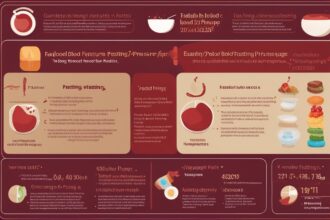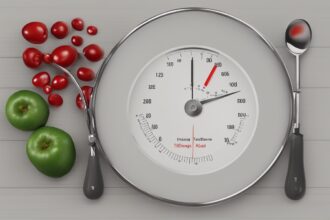Hey there, health enthusiasts! If you’ve been curious about the fasting benefits for overall wellness, you’re in for a treat today. fasting, a practice as old as time, has gained massive attention in recent years for its potential to transform health. From weight loss to mental clarity, the perks seem endless. But did you know that fasting might also play a significant role in managing blood pressure? High blood pressure, or hypertension, affects millions worldwide and is a leading risk factor for heart disease. In this deep dive, we’ll explore how fasting impacts blood pressure, unpack the science behind these fasting health advantages, and share practical tips to incorporate fasting into your life safely. Let’s get started on this journey to better heart health!
What Is Fasting, and How Does It Work?
Fasting is more than just skipping meals; it’s a deliberate choice to abstain from food (and sometimes drink) for a specific period. Whether it’s intermittent fasting (IF), where you cycle between eating and fasting windows, or prolonged fasting lasting several days, the goal is often to give your body a break from constant digestion. During fasting, your body shifts gears, tapping into stored energy like fat for fuel. This metabolic switch can trigger a cascade of health benefits, including potential improvements in blood pressure regulation. But how exactly does this happen? It’s all about how fasting influences your hormones, reduces inflammation, and promotes cellular repair—key factors in cardiovascular health. As we dive deeper, you’ll see why so many are raving about fasting benefits for the heart.
The Link Between Fasting and Blood Pressure: What Science Says
High blood pressure, defined as a reading of 130/80 mmHg or higher, puts strain on your arteries and heart, increasing the risk of serious conditions like stroke or heart attack. Could fasting be a natural way to keep those numbers in check? Research suggests it might. Studies have shown that intermittent fasting can lead to modest reductions in blood pressure by improving insulin sensitivity and reducing oxidative stress (Sutton et al., 2018). When you fast, your body produces less insulin, which can help relax blood vessels and lower blood pressure. Additionally, fasting promotes weight loss, a critical factor since excess body fat is often linked to hypertension (Hall et al., 2015). While the evidence is promising, it’s worth noting that results can vary based on the individual and the type of fasting protocol. Let’s break down some of the specific mechanisms behind these fasting health perks.
- Weight Reduction: Losing even a small amount of weight through fasting can lower blood pressure significantly.
- Improved Insulin Sensitivity: Fasting reduces insulin levels, which may help blood vessels function better.
- Reduced Inflammation:
- Autophagy: This cellular cleanup process, triggered by fasting, may support vascular health.
Types of Fasting and Their Impact on Hypertension
Not all fasting methods are created equal, and their effects on blood pressure can differ. Intermittent fasting, such as the 16:8 method (fast for 16 hours, eat during an 8-hour window), is one of the most popular approaches and has shown promise in reducing systolic and diastolic blood pressure in small studies (Wilkinson et al., 2020). Time-restricted eating, where you limit food intake to certain hours of the day, can also support cardiovascular health by aligning with your body’s natural circadian rhythms. On the other hand, prolonged fasting (lasting 24–72 hours or more) may offer deeper metabolic resets but should only be done under medical supervision due to potential risks like electrolyte imbalances. If you’re new to fasting, starting with a gentler approach might be the best way to tap into these fasting wellness benefits.
Practical Tips for Fasting to Support Blood Pressure
Excited to try fasting for its potential blood pressure benefits? Before you jump in, let’s talk strategy. Fasting isn’t a one-size-fits-all solution, and doing it wrong could lead to dizziness, fatigue, or even spikes in blood pressure if not managed properly. The key is to start slow, stay hydrated, and listen to your body. If you’re on medication for hypertension, consult your doctor before making any changes to your routine—fasting can sometimes alter how medications work (Mattson & Wan, 2005). Here are some actionable tips to help you maximize the fasting advantages for health while keeping safety first.
- Start Small: Begin with a 12:12 fasting schedule (12 hours fasting, 12 hours eating) before progressing to longer fasts.
- Stay Hydrated: Drink plenty of water during fasting periods to prevent dehydration, which can affect blood pressure.
- Focus on Nutrient-Dense Foods: Break your fast with balanced meals rich in potassium, magnesium, and fiber to support heart health.
- Monitor Your Numbers: Keep track of your blood pressure regularly to see how fasting impacts you personally.
- Avoid Overeating: Bingeing after a fast can negate the benefits, so practice mindful eating.
Potential Risks and Who Should Avoid Fasting
While the fasting benefits for blood pressure are exciting, this practice isn’t for everyone. Fasting can sometimes lead to low blood sugar, dehydration, or electrolyte imbalances, which might worsen health conditions or interact with medications. Pregnant or breastfeeding individuals, those with diabetes, or anyone with a history of eating disorders should steer clear unless under strict medical guidance (Longo & Mattson, 2014). If you experience symptoms like severe headaches, fainting, or irregular heartbeats during fasting, stop immediately and seek advice from a healthcare provider. Remember, the goal of exploring fasting for heart health is to improve your well-being, not to push your body beyond its limits.
How to Combine Fasting with Other Heart-Healthy Habits
Fasting alone won’t magically fix high blood pressure—it’s most effective when paired with a holistic lifestyle. Think of fasting as one tool in your heart health toolkit. Regular physical activity, stress management, and a balanced diet can amplify the fasting health advantages. For instance, moderate exercise like walking or yoga during fasting windows (if you feel up to it) can enhance circulation and lower blood pressure further. Reducing sodium intake and prioritizing whole foods over processed junk also works hand-in-hand with fasting to keep your heart happy. It’s all about creating sustainable habits that support the incredible fasting wellness benefits you’re aiming for. Talk to a nutritionist or doctor to craft a plan that fits your unique needs.
As we wrap up, it’s clear that the fasting benefits for blood pressure and overall heart health are worth exploring. From improving insulin sensitivity to reducing inflammation, fasting offers a natural, accessible way to support your cardiovascular system. That said, it’s not a cure-all, and individual results can vary. The key is to approach fasting with curiosity and caution, tailoring it to your lifestyle and health status. Whether you’re a seasoned faster or just dipping your toes into this practice, remember that small, consistent steps can lead to big changes. So, why not give it a try under the right guidance? Here’s to unlocking the fasting health perks and taking control of your heart health—one fast at a time!
References
- Hall, K. D., Bemis, T., Brychta, R., et al. (2015). Calorie for calorie, dietary fat restriction results in more body fat loss than carbohydrate restriction in people with obesity. Cell Metabolism, 22(3), 427–436.
- Cell Metabolism, 19(2), 181–192.
- Mattson, M. P., & Wan, R. (2005). Beneficial effects of intermittent fasting and caloric restriction on the cardiovascular and cerebrovascular systems. The Journal of Nutritional Biochemistry, 16(3), 129–137.
- Patterson, R. E., & Sears, D. D. (2017). Metabolic effects of intermittent fasting. Annual Review of Nutrition, 37, 371–393.
- Sutton, E. F., Beyl, R., Early, K. S., et al. (2018). Early time-restricted feeding improves insulin sensitivity, blood pressure, and oxidative stress even without weight loss in men with prediabetes. Cell Metabolism, 27(6), 1212–1221.
- Wilkinson, M. J., Manoogian, E. N. C., Zadourian, A., et al. (2020). Ten-hour time-restricted eating reduces weight, blood pressure, and atherogenic lipids in patients with metabolic syndrome. Cell Metabolism, 31(1), 92–104.






